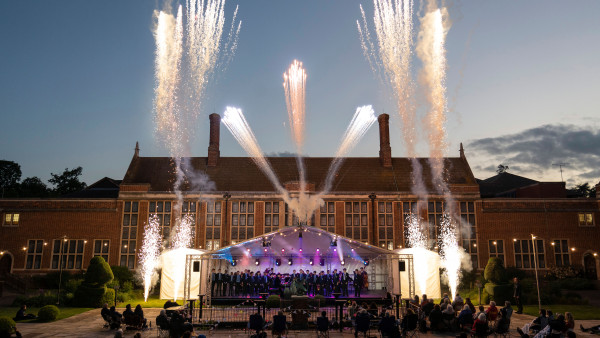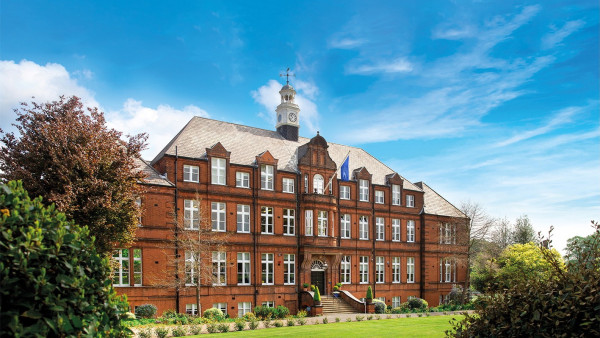There is a sense in which Trinity is a real standard-bearer: its students leave school with a respect and appetite for learning; its commitment to arts, music and sport seems to delight almost every pupil, and to reassure many parents who, often justifiably, worry that 21st century living involves no stimulus other than that achieved at the end of an iPhone. Its strong investment the local community helps to ensure that Trinity boys and girls leave the school emotionally intelligent and socially grounded. This is a school committed to practising the essence of good citizenship as well as to nurturing personal success.
Why read our school review?
Unlike other websites, schools can't pay to be included in The Good Schools Guide. This means our review of this school is independent, critical and fair, and written with parents' best interests at heart.
Unlock to accessOverview & data
- Pupil numbers
- 1,049 ·
- Sixth form numbers
- 329 ·
- Religion
- None
- Fees
- £29,240 pa
- Local authority
- London Borough of Croydon
- School ownership
- John Whitgift Foundation
Headteacher
Headmaster
Alasdair Kennedy
Since 2016, Alasdair Kennedy. He read engineering at Cambridge, but realised well before finals that what he really wanted was to teach maths and physics. Independent schools are woven deep into his DNA: his father was head of science at Fettes in
Unlock this review instantly
Learn what pupils and parents really think of this school, along with our expert opinion on the headteacher’s leadership style, the school’s academic results and facilities, the focus on pastoral care, and the range of extra-curricular activities.
Entrance
About 40 per cent of pupils come from other independent schools, and 60 per cent from state primaries. Given the different constituencies, the school has entry points for boys aged 10, 11 and 13, as well as at sixth form for boys and girls. An
- Open days
- Check website for information
Exit
Under 10 per cent leave after GCSE. Over 90 per cent go on to Russell Group universities. Popular destinations include Nottingham, Southampton, Warwick, Bath and Manchester. In 2024, 13 to Oxbridge and ten medics/dentists/vets. Occasionally one or
Latest results
In 2025, 86 per cent 9-7 at GCSE; 76 per cent A*/A at A level (95 per cent A*-B).
A levels or equivalent - Average points score (2024)
What is this?
These figures tell you the average grade and average points that pupils achieved in their academic qualifications. A maximum of 60 points are available for a grade A* at A level.
Teaching & learning
This is a selective school, but not preposterously so. The results, says the head, reflecting ‘plenty of hard work as well as natural talents’. A broad base of subjects with the accent, as one would expect, on traditional academic ones. Maths,
- Qualifications taken in 2024
- A level
- EPQ
- GCSE
Learning support & SEN
Special needs are taken seriously. ‘It’s entirely normal for boys in their early years to struggle with organisation,’ says the head. ‘We want to help them find ways to help themselves.’ The school has a learning support team, which sees pupils,
Arts & extracurricular
‘The school’s music is so good,’ said one parent, ‘that it defies any easy description.’ Famous for the Trinity Boys’ Choir, there are also superb opportunities for instrumentalists. Every new boy who does not already play a musical instrument is
Sport
A fine reputation for sport: ‘Participation is all,’ said head. Some 65 per cent of pupils are in school teams so ‘everyone who wants to represent the school can do so’. Trinity has worked hard and fast to integrate the new sixth form girls into its
Ethos & heritage
Trinity is one of the Whitgift Foundation schools. It opened in 1858, specifically designated the Poor School – an allusion to the economic circumstances of its pupils and not an aspersion on its talents. Moved to its present site in 1965, and while
Pastoral care, inclusivity & discipline
Year heads take responsibility for each age group and the annual intake is small enough for them to deliver on their commitment to know each pupil personally. Up to GCSE, the forms have about 20 pupils, each overseen by a tutor, and these are the
Mobile phone policy
A clear mobile phone policy is a really important part of modern schooling. This school has provided us with their policy.
Mobile phone policy
Students must keep mobile phones in their lockers during the school day (including break and lunch) and must have permission from a member of staff before using them. Use should only be for vital calls such as to parents. Sixth form students may have mobile phones with them, but these must be switched off completely during lessons and other activities, unless permission is given by a member of staff for their use.
Pupils & parents
Close links with parents are fostered, but in a usefully businesslike way. Grades are sent out every half term, recording progress and effort, and there are two parents’ evenings annually, as well as a full school report. It’s evident the school
Money matters
Lunch and transport are extras, as are most music lessons and the bigger trips, but the school is conscious it doesn’t want to price anyone out. One way and another, some 50 per cent of students are receiving some kind of financial support, and about
- Fee information
- £29,240 pa
The last word
There is a sense in which Trinity is a real standard-bearer: its students leave school with a respect and appetite for learning; its commitment to arts, music and sport seems to delight almost every pupil, and to reassure many parents who, often






